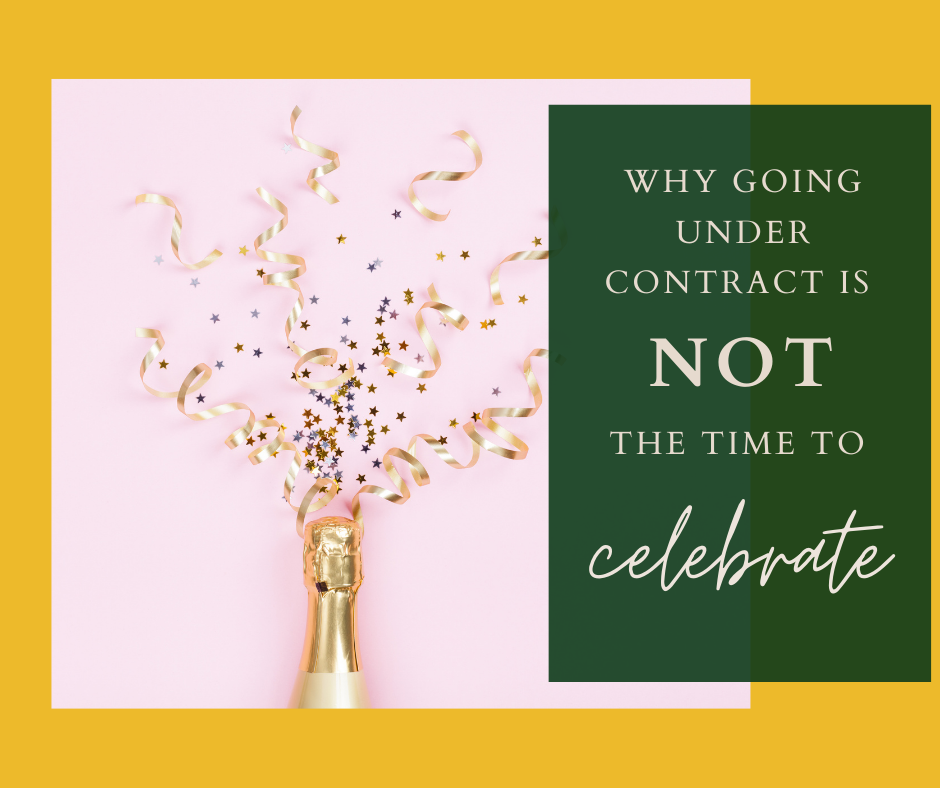It Ain’t Over ‘Till It’s Over: Why Going “Under Contract” Does Not Mean It's Time to Pop the Champagne Just Yet. Six Part Series: Part Five
Want to get the very most money for your Maine home in this hot sellers’ market?
Most people don’t realize there is much more to selling a home than taking a few photos and throwing it in Uncle Henry’s, Zillow or on Maine Listings (Maine’s Multi-Listing Service (MLS)), especially if you want the best price and the best contract terms for your property.
This is why Balsam Realty created our series, “Get the Most for Your House In a Hot Seller’s Market” - to help you (and anyone you know) maximize the profits from the sale of what may be one of your biggest assets. This is part five in our six-part series and is a must-read for any property owner, even if you aren’t selling anytime soon.
In this part of the series, you’ll learn why “going under contract” (when the seller and buyer have both signed a purchase & sale agreement for the property) is not yet the time to celebrate. There are many crucial tasks for the buyer and seller between signing the purchase & sale contract and getting to settlement (“closing” a.k.a. “champagne time”). There are many ways things can still go off the rails. It is critical you have guidance and the process is methodically managed.
Today, you’ll learn what key events will occur between contract and closing to ensure a successful sale.
From contract - until the moment your closing documents are signed - your real estate broker is your Closing Logistics Project Manager. Your broker’s job is to work with all players to ensure everyone does what they are supposed to do, when they are supposed to do it - so that you get to the closing on schedule and with the least amount of stress and hassle possible.
We’ll be working with you, the buyer’s agent, the buyer’s lender, the title company and all key players during this phase of the selling process. Your broker’s job is to assign tasks, continue to negotiate terms on your behalf (yes, there can still be negotiations right up until - or even, unfortunately, sometimes at - closing) and make sure all deadlines are met.
More than anything, our job is to make sure the terms you agreed to when you signed the contract are carried out correctly and on time. Sometimes, the “under contract phase” feels a little quiet because the parties involved are working diligently behind the scenes performing their due diligence in order to prepare the necessary documents. Our goal at Balsam is to demystify this phase.
Here’s a quick summary of what Balsam provides in the “under contract” phase to ensure success:
• Estimated net sheet - we’ll talk with you about the net amount you can expect from the sale - with updates as the numbers move from estimates to concrete terms (e.g. did you know that the remaining mortgage balance stated on your monthly invoice is likely not the amount you will pay off at closing?)
• Plot Important Dates - When we go under contract we plot all necessary milestones. Purchase and sale contract negotiated terms could include contingency deadlines, document review periods, appraisal and home inspection dates. We make sure crucial deadlines are met and agreements are kept.
• Introductions - Next, we make necessary introductions for key players. We make sure they have everything they need to begin their work. We keep the parties informed and supply additional information as needed, to ensure the process is on track and on time for champagne.
• Condominium or Homeowners Association (HOA) Documents (When Necessary) - We will get the condo or HOA documents ordered on a “rush” basis - to supply those to the buyer as quickly as possible. We will also secure all relevant information about the property (access roads, title information as to covenants, conditions & restrictions (“CCR’s”) etc.) to ensure the parties are informed.
• Earnest Money Deposit - Earnest money must be deposited on time - we will make sure that happens. Further, depending on the contract terms, the buyer may have the right to redeem earnest money if the contract falls through. We will review with you the terms under which the buyer can void the contract and receive their deposit back vs. when you are owed the earnest money if the contract terms are not met.
• Inspection - In today’s hot seller’s market, home inspection contingencies are less prevalent. However, if it is in the contract, the inspection is a critical step in the process that needs careful oversight. Before inspection, we will discuss with you the three parts to the inspection:
Prepping: Remember, the inspection is a showing. You want your home to look the same way it did when the buyers first fell in love with it. So, for this stage, you’ll want to still have it clean, clutter-free and looking its best. We will also guide you through what to do to get the property ready for inspection. You’ll want to make sure everything on the inspector’s punch list is accessible and in good working order.
During the inspection: The inspection appointment normally will take 1-4 hours. You are not required to follow the inspector through the appointment but will want to be present to answer questions. You will not automatically receive a copy of the inspection (it is confidential and prepared for the buyer) but you can request a copy from the buyer.
After The Inspection: Once the inspection is completed, the ball is in the buyer's court. Depending on how the inspection was initially negotiated and agreed upon: 1. the buyers may send a list of requests for repairs or monetary concessions; 2. they may void the contract entirely; or 3. they will move forward with the purchase as agreed upon. In any event, we’ll have a game plan— if there is a request for repairs, we can review the list and negotiate what you will and won’t do - in the rare instance where they void the contract - we’ll discuss when and how to put your home back on the market (and what if any action needs to be taken in order to ensure future buyers are satisfied with the inspection).
• Lockbox - When the inspection is over, we take off the key lockbox immediately. Why? Because we don’t want anyone to have access to your home (especially if it is vacant) — without you or Balsam present between now and closing.
• Track The Buyer’s Loan - If the contract has a financing contingency or a buyer is seeking loan approval, we touch base with the buyer’s lender at very specific times during the “under contract” period to ensure:
The buyer has updated approvals from the lender as the process unfolds - especially if the appraisal does not match the agreed upon purchase price or other events and negotiations change the contract terms;
The buyer’s loan is on track at key points through the approval process;
Financing and appraisal contingency dates are met and the buyer follows through with all loan requirements (buyers can tank a loan approval if they quit their job, experience a credit score drop, have a significant change in liquid assets or make a sizable purchase before the closing);
The buyer has received their closing disclosure in the correct amount of time; and
The title company has all necessary information from the lender to close on the contract’s agreed-upon closing date.
• Appraisal - Given the current seller’s market, appraisal contingencies are often waived in negotiations (or the buyer may agree to cover any gaps between the appraised value and the agreed upon purchase price in cash). However, if the appraisal comes in low, the buyer may find themselves in a tight spot to cover the difference. Thus, awaiting appraisal can be nerve-wracking for all parties.
There are many factors that can help an appraiser understand the value of a particular home. Often appraisers don’t have access to all the information that could help them support a higher price point on a property - especially in today’s market where homes are selling for far more than recent comparable sales (“comps”) would support. Appraisers do not generally go into the home and sometimes do not set foot on the property and instead rely on public information sources that may be outdated or inaccurate. Therefore they may miss any recent upgrades to the home or property.
We will want to make a strong case for the price that you and the buyer have agreed upon. We put together a package of material to support the purchase price - a selection of key items to help the appraiser base their report on accurate and up to date information. Some of this information the appraiser would not know without our help. We then personally meet with the appraiser (assuming they allow it), review this information and answer questions.
• Vendor List: If you need suggestions for any services like professional movers, cleaners, or any repairs or upgrades, we will supply you with a list of companies we recommend who are generally reliable and provide great customer service.
• Final Walkthrough - The contract usually provides for a final walk-through of the property with the buyer (usually in the 24 hours before closing). The point of the final walk-through is to make sure your home is ready for the buyers to take ownership and to confirm that any home inspection follow-up items have been completed.
• Condition of Home at Closing - The contract generally calls for your home to be in “broom swept” condition with all your belongings out in time for close. The golden rule of leaving a property is to leave it as you would like to find your new property. There are even opportunities for negotiating with the buyer to leave some items in place, instead of clearing them out. We recently sold a 3-season lake camp where the sellers left the linens and kitchen utensils for the new buyers. Another home came with a piano in the family room and yet another with a meat freezer in the basement.
• Final Transition Checklist - About ten days before closing, you’ll receive a final checklist. It will serve as a reminder about when and how to do things like transfer your utilities, cancel or transfer homeowners insurance, gather keys, garage clickers, parking permits, alarm codes— all the “tiny” but important things you and the buyer need in place for a clean transition.
• Final Document and Numbers Review - A few days before closing and as soon as the documents are ready from the title company, we’ll schedule a time to review them with you to prepare you for the closing. That way you will have time to read and understand them thoroughly before signing. We will also update the estimated net sheet for you at this time.
• Closing Day Logistics - We’ll make sure you know where to go, what you need to bring and what to expect on closing day. Remember - it is not essential that you be at the closing. We can coordinate signatures prior to closing in person or from anywhere in the world.
• Next Day Check In - Last, but not least, we’ll touch base with you after closing to make sure you’ve received your funds in full and then answer any last questions you have about your sale.
• *Celebrate* - Now’s the time to pop the bubbly!
There’s a lot to do once you are under contract to ensure everything goes smoothly - but don’t worry. As your Closing Logistics Project Manager, Balsam will be with you every step of the way. And, although we work tirelessly so everything works like clockwork, we’ve also got a plan b (and c) so that no matter what happens, we won’t lose any time getting you to a successful outcome.
If you’ve been thinking about selling your home and want to know how to get the very best price and terms - or you just want to hand over the keys and let us handle it all, we are here for you. The first step is for us to have a conversation about your next move.
You can schedule a chat with us here.


